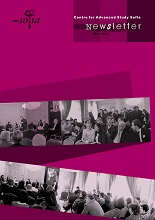
CAS Newsletter 2011/2012
Articles, pictures and interviews can be reprinted only with the consent of Centre for Advanced Study Sofia (CAS - Sofia). Any citations should be duly acknowledged.
More...We kindly inform you that, as long as the subject affiliation of our 300.000+ articles is in progress, you might get unsufficient or no results on your third level or second level search. In this case, please broaden your search criteria.

Articles, pictures and interviews can be reprinted only with the consent of Centre for Advanced Study Sofia (CAS - Sofia). Any citations should be duly acknowledged.
More...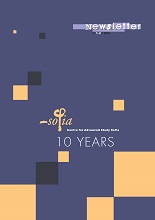
Articles, pictures and interviews can be reprinted only with the consent of Centre for Advanced Study Sofia (CAS - Sofia). Any citations should be duly acknowledged.
More...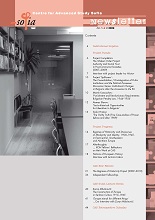
Articles, pictures and interviews can be reprinted only with the consent of Centre for Advanced Study Sofia (CAS - Sofia). Any citations should be duly acknowledged.
More...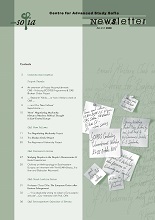
Articles, pictures and interviews can be reprinted only with the consent of Centre for Advanced Study Sofia (CAS - Sofia). Any citations should be duly acknowledged.
More...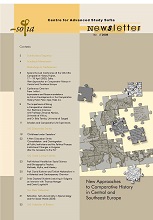
Articles, pictures and interviews can be reprinted only with the consent of Centre for Advanced Study Sofia (CAS - Sofia). Any citations should be duly acknowledged.
More...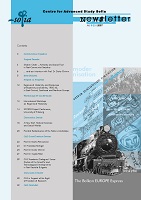
Articles, pictures and interviews can be reprinted only with the consent of Centre for Advanced Study Sofia (CAS - Sofia). Any citations should be duly acknowledged.
More...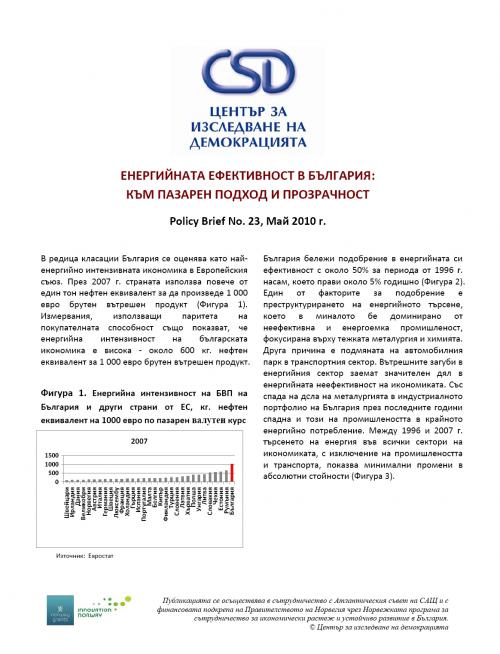
Measured by using market currency exchange rates, Bulgaria has consistently ranked as the most energy intensive economy in the EU: in 2007, it used over a ton of oil equivalent to produce 1,000 Euro worth of gross product. Measured by using purchasing power parity, Bulgaria’s energy intensity is still dismal, around 600 kg of oil equivalent per 1,000 Euro of product. Even though still negligible by any standard, Bulgaria’s energy efficiency has actually improved by about 50% since 1996 and has been on an uninterrupted path to a change for the better by about 5% per year. Overall, the Bulgarian economy seems to have completed the transition from heavy industry to less energy intensive light industry and thus already picked the low hanging fruit of natural gains in efficiency. The country is probably at a point, as some experts argue, from which onwards any additional gain in efficiency will have to be attained through advances in technologies of energy production, conversion, transportation, and use which will call for cost-effective approach and a strong incentive system.
More...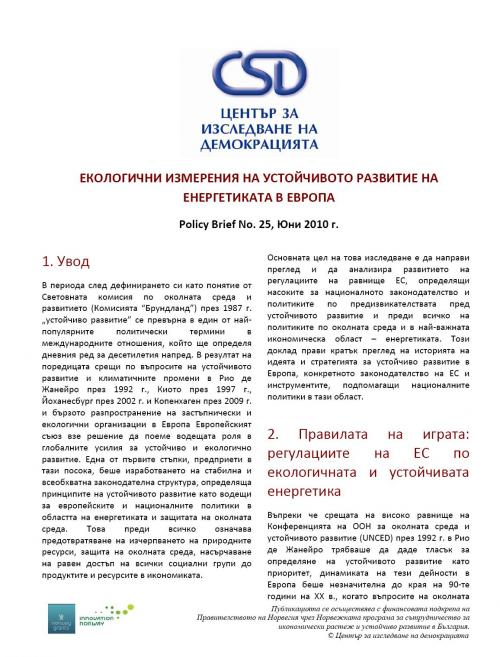
Main purpose of this study is to review and discuss the development of regulation at EU level to guide corresponding national legislation and policies designed to address the challenges of sustainable development, notably those on the environment dimension and as regards to the most relevant economic sector – energy. The paper will briefly examine the development of the idea and strategy for sustainable development in Europe over time, the concrete EU legislation and instruments to facilitate national policies to support such development.
More...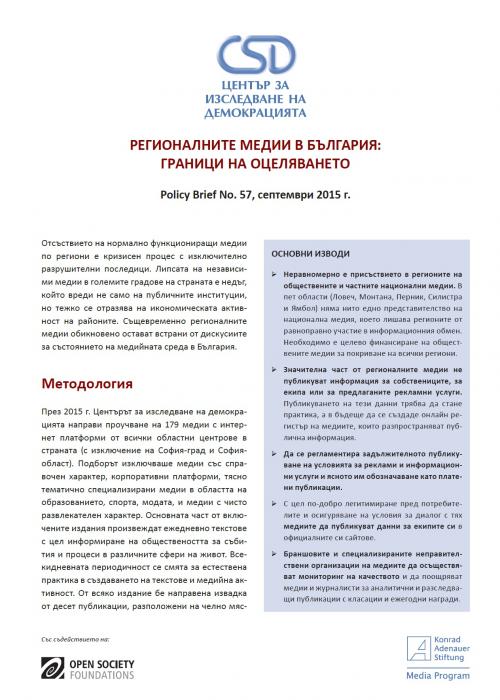
The lack of adequate local media is a trend with devastating implications for the regions of Bulgaria. It affects not only the local public institutions; regional economic activity is also hindered by the absence of independent media. At the same time, when discussing the state of media in Bulgaria, the problems of local media are often overlooked. The current publication presents the results of a survey of 179 local media with internet presence. The analysis focused on the mechanisms and factors that prevent journalists and the media from informing the public in an objective, competent, and comprehensive way.
More...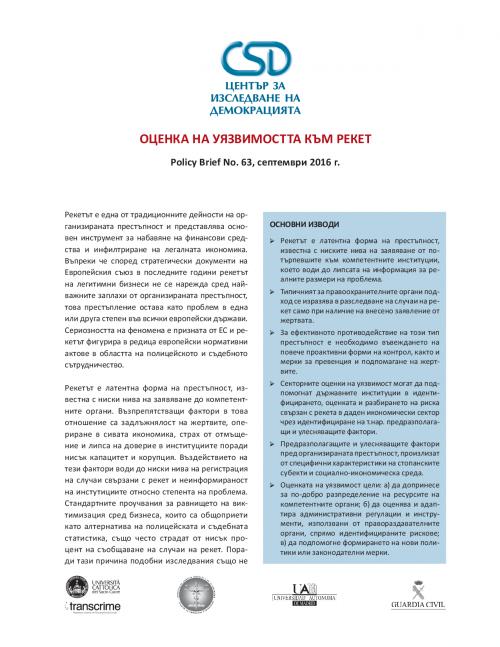
Extortion racketeering has long been pointed out as the defining activity of organised crime. It has also been identified as one of the most effective tools used by organised crime in the accumulation of financial resources and the penetration of the legal economy. Although in recent years this crime has not been among the top listed organised crime threats in the strategic EU policy documents, it still remains ever present in European countries. The seriousness of the phenomenon has been recognised at the EU level and the crime has been listed in a number of EU legal acts in the field of police and judicial cooperation in criminal matters.
More...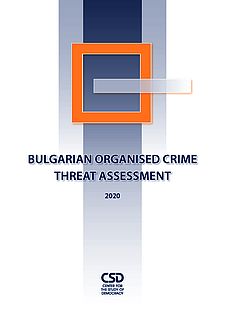
The 2020 Bulgarian Organised Crime Threat Assessment is the third in a series of studies which, on an annual basis, canvasses the state, volume and structure of the major criminal markets. The report also captures the trends related to organised crime over the period 2017–2019.
More...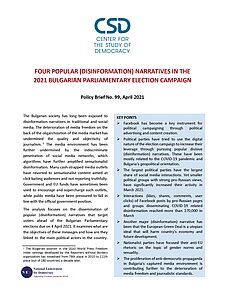
The Bulgarian society has long been exposed to disinformation narratives in traditional and social media. The deterioration of media freedom on the back of the oligarchization of the media market has undermined the quality and objectivity of journalism. The media environment has been further undermined by the indiscriminate penetration of social media networks, which algorithms have further amplified sensationalist disinformation. This policy brief zooms in on the prevalence and connections to the pre-election campaign of four popular (disinformation) narratives related to conspiracy theories about COVID-19, to the support of the large Russian energy projects, the opposition to the European Green Deal and the growing anti-EU sentiments in the Bulgarian society.
More...
Worldwide, the security sector is dominated by men, and Serbia is no exception to this. Recent times have seen some changes to this situation, with the quota system being among the factors responsible for this. Quotas are provisional measures which set a minimum proportion of women in security sector institutions. In the Serbian security sector, a quota system is used for the enrolment of women in police or military schools or in training for police or military jobs. Are quotas suitable for resolving the problem of inequality between women and men? Do they constrict or encourage the recruitment and promotion of women in traditional security institutions? Do they alter the prevailing perception of the role of women in the security sector, or do they reinforce existing preconceptions? This paper focusses primarily on analysing the way in which the quota system has been applied in the Serbian police and military. Based on this, recommendations are made for security and defence system institutions. In addition, the paper attempts to identify the origin of quotas and to outline the advantages and shortcomings of their application in the security sector.
More...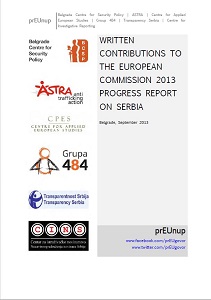
“prEUnup” (ser. prEUgovor) is the first coalition of civil society organizations formed in order to monitor implementation of policies related to the Accession Negotiations between Serbia and EU, with an emphasis on Chapters 23 (Judiciary and Fundamental Rights) and 24 (Justice, Freedom and Security). “prEUnup” is formed on the initiative of Belgrade Centre for Security Policy (BCSP) with the mission to propose measures to improve the condition in the fields relevant for the negotiation process. In doing so, the coalition aims to use the process of EU integration to help accomplish substantial progress in further democratization of Serbian society.
More...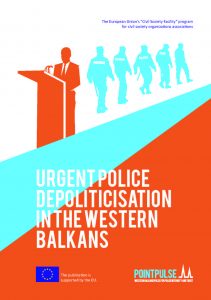
One of the biggest problems faced by the police in the Western Balkans is politicisation and lack of operational independence from political leaders and structures. This is confrmed by the legal framework on policing which introduces a wide scope of competencies of Ministers of Interior and other politically elected figures, and by the citizens’ perception that the police serve the political parties’ interests. The Bosnia and Herzegovina (BIH) Law on Internal Affairs of 2014 allows direct and indirect influence of political parties and officials on the autonomy of the police. Most important shortcomings are related to the Federal Minister of Interior who is allowed to make decisions regarding concrete police actions, influence human resources micro-management, and decide on the use of police finances and detention treatment and rules. The Law only declaratively stipulates that the police are subjected to civilian and democratic control. However, more than 80 percent of the citizens of BIH believe that the influence of politics on operative work of the police is quite high. In Kosovo, before the Prime Minister takes a decision on the appointment of Police Director General, the Minister of Internal Affairs interferes in the process by establishing and regulating the work of the Commission whose task is to nominate the candidates. The 2012 Law on Police in Kosovo allows direct influence of the Minister of Internal Affairs on the internal organisation of the police and the establishment of special police units. The Minister can compromise the operational independence of the police regardless of the fact that the Law on Police stipulates otherwise. More than 70 percent of the citizens perceive police as politicised and fully, or to some extent, under political control. The Montenegrin Law on Internal Affairs of 2012 allows the Minister of Interior to influence the Police Director’s appointment by proposing the candidate to the Government, and to influence the work of the Police Directorate by appointing Police Director’s deputies. The Minister is allowed to define the exceptions concerning the duties that are deemed incompatible with police work, but he also has discretionary powers to allow police officers to conduct some activities that are in contravention to the rules if he estimates that this will not harm the professional work of the Ministry. The Minister can decide in disciplinary proceedings and develop its rules. The public image of the police as an authority serving the citizens is better, to the extent that the legal framework is more progressive – one third of the citizens believe that the police is working in their interest. The Serbian Law on Police of 2016 does not create sufficient and necessary conditions for depoliticisation of the police. The text of the law mentions “respect for the operational independence of the police” but fails to specify what that actually means. The Minister of Interior is allowed to prescribe the mode of performance of internal affairs tasks, request reports, data and other documents relating to the work of the police and the Ministry, and provide the Internal Affairs Sector with binding instructions for work, as well as with orders to perform certain tasks and undertake certain measures. The Minister is given the power to assign and dismiss the highest ranking heads of the Police Directorate. More than 80% of the citizens see the police as an institution serving others’ interests instead of theirs. There are various legal shortcomings influencing the operational independence of the police in the Western Balkans. It is therefore necessary that the international community – the European Union (EU) in particular – advocate the development of legal instruments and institutional mechanisms which will prevent the political leaders and structures from crossing the forbidden line and becoming involved in the operational work of the police.
More...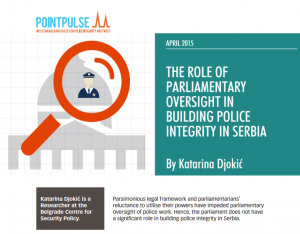
Parsimonious legal framework and parliamentarians’ reluctance to utilise their powers have impeded parliamentary oversight of police work. Hence, the parliament does not have a significant role in building police integrity in Serbia.
More...
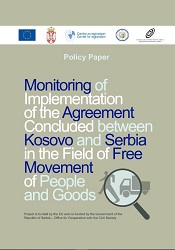
On top of all respect for previously concluded and future talks and agreements, the agreement on freedom of movement of people is one of the fundamental agreements, and evaluation of overall relations between Belgrade and Pristina shall depend on its implementation. Can normalization be discussed if people cannot move and communicate freely? Are obstacles to free movement of people still present and what can be done to remove those obstacles? Freedom of movement is one of the fundamental freedoms upon which EU stands and substantial progress of Belgrade and Pristina on the way toward the EU depends on readiness to respect and guarantee that freedom. Agreement on freedom of movement was concluded in July 2011 and implementation of the agreement began on December 26th 2011. This agreement provided free movement for citizens of Kosovo and Serbia within territories of Kosovo and Serbia. This was made possible with identification documents (personal ID cards). Freedom of movement also includes traveling by vehicles, on condition of paying mandatory border (administrative) insurance. Agreement on integrated management of border/administrative line was concluded by teams of negotiators during the technical dialog in December 2011, but the implementation did not begin until December 2012, one year after the dialog, immediately upon the beginning of political negotiations between the Premiers of Serbia and Kosovo.
More...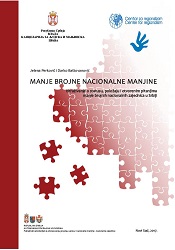
Research on the status, position and open issues of smaller national minority groups in Serbia.
More...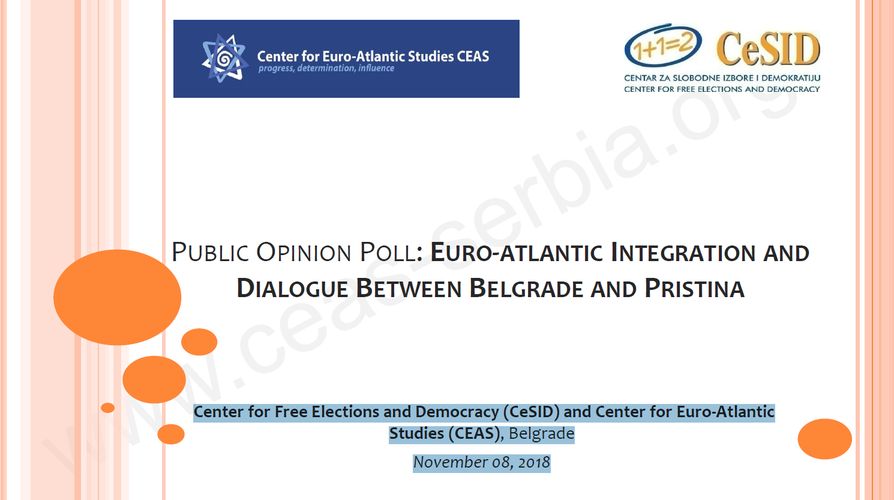
Center for Free Elections and Democracy (CeSID) and Center for Euro-Atlantic Studies (CEAS), BelgradeNovember 08, 2018
More...